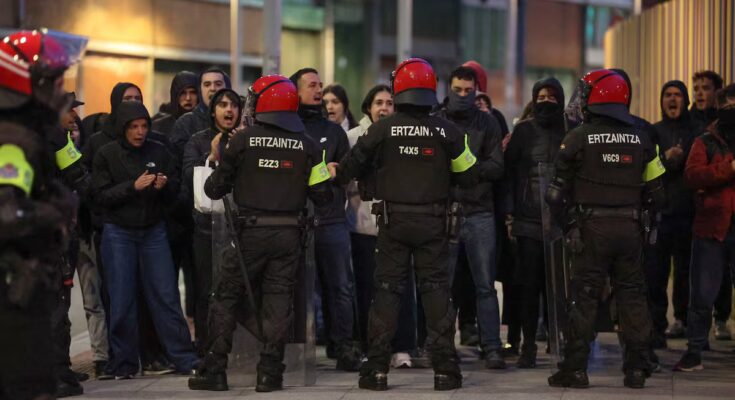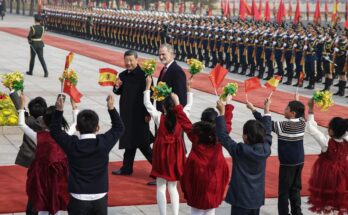When journalists call the Ertzaintza Communication service to find out the details of an arrest, they receive information about what, when, where and how. But for three weeks, when you ask who, information has already been provided that until now had been deliberately hidden. In addition to sex or age, the origin of the arrested person is also detailed. In his notes written for the media, it is usually included in the last paragraph.
The Basque police do not mention the specific nationality of foreigners arrested, unless they are Spanish, in these cases they indicate it explicitly. Far from informing about the country, the communications reflect the provenance by geographical areas. That is, the detainee is said to be of “Maghrebi, Latin American, European, Asian or sub-Saharan” origin, among others.
This represents a break in the consensus that existed until now and that the Department of Security itself had promoted more than ten years ago in a participatory process with journalists and the media. The Ertzaintza thus becomes the first police force in the state to communicate the origin of its arrestees.
The security advisor of the Basque government, Bingen Zupiria (PNV), admits a change in criteria and “philosophy”. He states that he has “the impression that, in the last season in Euskadi, hiding the origins of people arrested or under investigation gives rise to the stigmatization of some communities or gangs.” The political leader defends that “the worst favor we can do ourselves is not to put all the data on the table and let ourselves be carried away by those who in an interested way want to give a greater feeling of insecurity and throw away the data that interests them”.
The leader aims directly at the People’s Party and Vox. In statements to Cadena SER, he assured that these two parties disseminate the data of their parliamentary responses to some media “as they deem appropriate”. “I prefer to be the one to provide this data,” says the consultant. Zupiria, who worked as a journalist until entering politics, asks us to “address the issue of security head-on, providing all the data and in total transparency. We must take this issue seriously”.
When asked about the reason for the lack of diffusion of the nationality and only of the geographical scope, he explains that “it is not the same thing to say Moroccan as Maghrebi”: “In recent years there are some nationalities that stand out more than others, and this must be taken into account”.
Criticisms on the left
The left-wing parliamentary groups are calling for a rectification. The representative of EH Bildu Eraitz Sáez de Egilaz defines the statements made by the councilor in recent days as “very serious”. And he criticizes his decision: «Of the 75 parliamentarians who sit here, eight, and above all one (in reference to the People’s Party and the sole representative of Vox), influence him».
“Can a minority determine the policies and historical position of a government that has an absolute majority” of the PNV and PSE?, he asks. And he adds: “Here we have the conditions to do politics differently. The majorities are based on human rights, mutual respect and solidarity.”
For his part, the parliamentarian of Sumar Mugimendua expresses his concern to EL PAÍS. “It seems irresponsible to us that he gave in to pressure. We know that these types of actions promote racism, discrimination and stereotypes”, underlines Jon Hernández. “The Ertzaintza and the Basque government must act rigorously, following a principle of non-discrimination and this, of course, provides no informational value. It only reinforces incitement to hatred,” he protests.
Rejection of social groups
Complaints also come from organizations and social associations that work with migrants. The president of ONGD Mundubat, Eneko Gerrikabeitia, speaks like this: “It doesn’t seem right to me because unfortunately we are playing with the term security”, he claims. In his opinion we are “entering the game of prejudging these people and falling into stereotypes”. “It seems to me that we must judge the facts and not the people,” he says and adds: “I think that one of the rights is violated, that of identity, and almost that of the presumption of innocence when referring to the origin of people”.
The president of the Biscay association San Nikolas Zabalik, dedicated to the integration of the Maghreb collective, explains her position in the same direction. Aintzane Monteverde adds that communicating one’s origin or nationality will mean “stigmatizing the kids” and “taking it for granted, in some way, that they are guilty.” Monteverde believes that this is not a way to “protect the presumption of innocence of these people”. “For a few, the others will pay the consequences,” he says.
Increase in violations
According to the latest Ertzaintza report, with data updated to September, criminal crimes increased by 1.36% in the Euskadi. Of the total, 28,758 cases were closed with people detained or under investigation. The majority, 15,294 (53%), were committed by people of Spanish nationality, while the cases attributed to people of foreign origin were 13,448 (47%).
The Basque Institute of Statistics (Eustat) calculated at the beginning of the year that 9.9% of the Euskadi population had foreign nationality, i.e. 217,489 people. For its part, the number of residents born abroad (including those who have already obtained the Spanish one) amounts to 298,422 people, 9.6% more than in 2023.
The latest survey on the concerns of Basque citizens published by the Basque Government concludes that citizens’ feeling of insecurity occupies fourth place, after housing, employment and health. It is the main concern for 21% of the population, which places it at the highest level in recent years. The Department of Security will have a budget of 850 million euros in 2026, 6.4% more than this year.



